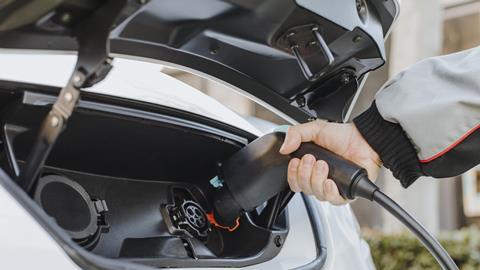A fast track consultation of the Zev Mandate, announced yesterday (26 November), could see the government row back on mandatory targets which currently require 70% of all new van sales and 80% of all new car sales to be electric by 2030.
The government is under pressure to act after van manufacturer Stellantis this week revealed plans to close its Luton plant and consolidate production at Ellesmere Port, in response to the costs associated with observing the UK’s ZEV mandate.
The move follows warnings from Stellantis earlier this year that it might stop UK production without more government support for the transition to electric vehicles.
The Society of Motor Manufacturers and Traders (SMMT) is also calling for urgent government intervention, warning that weak demand for EVs, combined with the need to meet the ZEV Mandate sales quotas, will cost the industry some £6bn in 2024, and even more next year.
Speaking at the SMMT annual dinner last night (26 November) Business Secretary Jonathan Reynolds confirmed a fast track consultation will be launched in the coming weeks.
Reynolds had already told the House of Commons Business and Trade committee last week that the ZEV Mandate was “not working.”
However, he also stressed that the government is still committed to the 2030 phase out date for petrol and diesel vehicles, but said it is clear there is a need for more support to make the transition to electric a success.
Options on the table include a relaxation of the ZEV mandate percentages and an easing of the fines manfacturers face for missing targets.
In a statement issued today, SMMT said that the market had changed since the mandate was launched two years ago, pointing to the current tough economic conditions and geopolitical tensions.
The society said that when the mandate was unveiled, industry anticipated that 457,000 electric cars would be registered in 2024, accounting forr 23.3% of all new car registrations. However, the latest outlook shows 94,000 fewer cars will be registered, totalling just 363,000 with a market share of 18.7%.
Meanwhile van sales are even worse, halving to just 20,000 units expected to be registered this year, a 5.7% market share against a 2024 target of 10%.
SMMT added: “The mandated targets have given manufacturers no option but to subsidise sales, incentivising fleet, business and consumer EV sales through an estimated £4bn worth of discounts.
“Despite this, the industry looks likely to fall short of the 22% EV market share demanded, potentially creating a £1.8bn bill for compliance for those missing their targets for cars alone, either to government or to competitors, most of whom manufacture their EVs abroad.
“Van manufacturers will face further costs, with market demand drastically behind the ambition set by the mandate.”
Mike Hawes, SMMT chief executive, added: “We need an urgent review of the automotive market and the regulation intended to drive it. Not because we want to water down any commitments, but because delivery matters more than notional targets.
“The industry is hurting; profitability and viability are in jeopardy and jobs are on the line. When the world changes, so must we. Workable regulation – backed with incentives – will set us up for success and green growth over the next decade.
“Rapid action to stimulate demand and adjust the regulation to reflect market realities is urgently needed to safeguard the sector’s potential to deliver £50bn in growth over the next decade.
“A robust, competitive market would ensure a greater volume of EVs reach the road more rapidly – a more important marker for decarbonisation than market share – and encourage greater investment in UK manufacturing and the thousands of jobs it provides.”
The Association of Fleet Operators (AFP) welcomed the government’s decision to hold a consultation but called for special attention to the challenges facing electric van sales.
AFP chairman Paul Hollick said: “The real test of the government will lie in the changes that it chooses to make. From a fleet point of view, we believe that while the car element of the ZEV Mandate requires some moderation, vans are the real issue.
“Electric van sales have been flatlining at around 5% for over a year and the reasons for this are that the practical limitations of the available models – range, payload, charging facilities – make them unsuitable for many operators.
“Because of these factors, we’re in a situation where, no matter what percentage of new vans manufactured are electric, large numbers of our members are planning to stick with their existing diesel vans for the foreseeable future. Making fleets hang onto older, more polluting vehicles for longer is obviously not what the government intends.
“It’s potentially a concern that the government says it remains fully committed to the 2030 deadline for ending pure petrol and diesel sales because there will probably need to be some flexibility, even if just around the definition of hybrids. Fine tuning the ZEV Mandate probably won’t improve the overall situation. Instead, more direct, radical action is needed if we’re to avoid more factory closures of the type announced by Stellantis today.”
The charging sector has met the news with some concern. Vicky Read, ChargeUK chief executive, said: “Billions of pounds of investment in the EV charging infrastructure roll out will be put at risk should the ZEV mandate be redrawn. This would be particularly foolish given the charging industry is busy deploying the infrastructure that is essential for the automotive sector to sell EVs and for the UK to meet its net zero goals.
“ChargeUK members are getting on with the job – putting a new charge point in the ground every 25 minutes on average, and urgently need reassurance to enable them to follow through on our commitment to invest over £6bn up to 2030 ensuring we stay ahead of demand.”

















